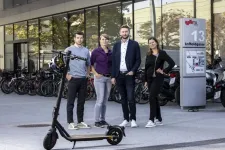(Press-News.org) Sweden is far ahead when it comes to promoting open access to scholarly publications. But there is risk of getting stuck in a permanent transformation that favours large commercial publishers. A new report from the Association of Swedish Higher Education Institutions develops a strategy on how to work in negotiations with the publishers.
In 2021, the Association of Swedish Higher Education Institutions (Sveriges universitets- och högskoleförbund, SUHF) convened a “Beyond transformative agreements” working group (the BTA group) to lay the foundation for further advancing the transition to open access. Now, the group has proposed a strategy for how Sweden – and the Bibsam Consortium – should operate in its negotiations with the publishers. The aim is to move away from transformative agreements to a financially sustainable system that stimulates the transition to a fully open publishing system.
The current publishing system has several flaws that negatively affect research, at the individual level (the researcher), and at the systemic level (Higher Education Institutions, HEIs and research funding).
“Subscribing to and publishing in scholarly journals is expensive, and costs are increasing. Additionally, the publishers' business model is based on researchers transferring the rights to their own work, despite the fact that in many cases this work is paid for with public funds”, says Astrid Söderbergh Widding, President of Stockholm University and chair of the BTA group.
In recent years, the national work on open access to scholarly publications has had a clear focus on signing read and publish agreements with the scholarly publishers (“transformative agreements”, TA) in order to reach the government's goal of immediate open access to findings of all publicly funded research. In Sweden the work has been successful because we signed transformative agreements with most major publishers. In 2022, 70 per cent of all articles in scholarly journals with at least one author from a Swedish HEI were open access.
These types of transformative agreements were signed with the hope that the publishers would convert more of their journals to fully open access journals. But that has not happened. The publishers are actively working to obtain income from both subscriptions and publishing, and they therefore see this type of agreement as a long-term solution.
“We run a substantial risk of getting stuck in a perpetual transformation that also contributes to increasing costs. At the European and global levels, transformative agreements have often served as the starting point for working more systematically with negotiations with publishers, as Sweden has now done for a long time,” says Wilhelm Widmark, Library Director at Stockholm University Library and member of the BTA group.
The BTA group contends that it is vital for control of scholarly publication to reside in the research community, while also emphasizing the need to reduce publication costs. The group’s primary recommendation is that the Bibsam Consortium should refrain from entering read and publish agreements in hybrid journals. Instead, it should only sign agreements for publication in fully open access journals. The group also propose complementary and supporting strategic initiatives and actions. These include:
* Signing agreements with publishers that only publish open access journals.
* Providing an independent publishing platform like Open Research Europe (ORE).
* Improving the opportunities for migrating researcher-owned journals from traditional publishers to other platforms.
* Continuing to work with copyright issues related to open access.
The Bibsam negotiating group has initiated discussions with a couple of the largest publishers about the need for a new form of agreement beyond transformative agreements, with the goal of only entering agreements for publishing as a service that is transparent and reasonably priced.
“An international discussion is needed on how we should move forward beyond the transformative agreements – here is Sweden's contribution to this discussion,” says Wilhelm Widmark.
Read the report Charting Sweden's path beyond transformative agreements – analysis and proposals for strategic direction
Contact
Wilhelm Widmark, Library Director at Stockholm University Library
E-mail: wilhelm.widmark@su.se Phone: 00468-16 27 33 or 004670 27 97 140
------
The group's recommendation regarding the basic strategic direction:
• The Bibsam Consortium should primarily not sign read and publish agreements in so-called hybrid journals, but instead only enter into agreements for publishing in fully open access journals. This approach should be implemented by 2026 at the latest, and it should apply to all fully open journals, regardless of the publisher.
For this position to be feasible in negotiations with publishers and to be implemented in practice, work with various complementary and supporting strategic initiatives and measures also needs to be carried out. This may include:
* Agreements with publishers that exclusively publish open access journals should be developed. Agreements should be designed to avoid profit maximization through large publication volumes, and it is important that such agreements do not encourage uncontrolled growth in the number of journals but rather promote the transformation of existing journals.
* Provide an independent publishing platform that also includes peer review of published articles. One possible route could be to join the EU platform, Open Research Europe (ORE).
* The possibilities for migrating researcher-owned journals from traditional publishers to other platforms should be expanded and encouraged.
* Continuing work on copyright issues for open access is important but dependent on international developments in the copyright field, mainly within the EU.
* Communication and engagement with both HEIs and researchers is crucial, both in terms of the problem at hand and the proposed measures.
END
Open access: Need to move away from transformative agreements
2023-10-18
ELSE PRESS RELEASES FROM THIS DATE:
Graz University of Technology study on e-scooter accidents: more helmets and less speed reduce the injury risk
2023-10-18
The use of e-scooters has increased significantly in recent years, but so has the number of accidents involving this relatively new form of transport. At the same time, knowledge about injury mechanisms in this area was still very limited. In the project SURF, funded by Zukunftsfonds Steiermark, the Vehicle Safety Institute at Graz University of Technology (TU Graz) investigated this topic using Human Body Models and derived recommendations to reduce the injury risk in e-scooter accidents.
Put on a helmet, decrease speed and get off the pavement
As ...
Reef-devouring predator survives coral bleaching and feasts on the survivors
2023-10-18
Research conducted by marine biologists from the University of Sydney has found juvenile crown-of-thorns starfish can withstand tremendous heatwaves well above levels that kill coral. These starfish then develop into carnivorous predators that devour reefs just as they begin to regrow.
Crown-of-thorns starfish are native to the Great Barrier Reef and found in the Indo-Pacific region, but they are classified as a species of concern because the damage large populations cause to coral is more significant than any other species. ...
Does SARS-CoV-2 infection have urological effects?
2023-10-18
Research published in the Journal of Internal Medicine indicates that SARS-CoV-2 infection may worsen lower urinary tract symptoms (LUTS) in men.
The study included 17,986 men receiving medication for LUTS within the public healthcare system of Hong Kong in 2021–2022, half of whom had SARS-CoV-2 infection. The group with SARS-CoV-2 had significantly higher rates of retention of urine (4.55% versus 0.86%); blood in the urine (1.36% versus 0.41%); clinical urinary tract infection (4.31% versus 1.49%); bacteria in the urine (9.02% versus 1.97%); and addition of 5-alpha reductase inhibitors, which are drugs prescribed for enlarged prostate. (0.50% versus 0.02%). These urological ...
How did the initial COVID-19 wave affect mental health in the UK?
2023-10-18
New research published in Economic Inquiry reports substantial increases in psychological distress in the UK during the first wave of the COVID-19 pandemic.
Mental health effects were more pronounced for females; younger individuals; Black, Asian, and minority ethnic communities; and migrants. Also, people who had financial worries, loneliness, or were living in overcrowded dwellings experienced significantly worse mental health deterioration during the first wave.
The study used data from the UKHLS, also known as Understanding Society, which is a household panel dataset that captures, among other things, information from adults about their economic and social circumstances, ...
Heat-tolerant predatory sea stars will likely be a threat to coral during climate change
2023-10-18
Population outbreaks of the crown-of-thorns sea star (COTS), a predator of coral, can cause widespread coral mortality. COTS are herbivorous as juveniles but then switch to coral consumption as they grow to adulthood. When researchers exposed juvenile COTS to heat stress scenarios at time and temperature durations designed to reflect conditions that cause coral bleaching and mortality, juveniles exhibited tolerance to heatwave conditions well above levels that kill coral.
The findings, which are published in Global Change Biology, indicate that juvenile COTS are likely to persist as major coral predators in reefs already vulnerable to the effects of climate change.
“This ...
Does COVID-19 affect Alzheimer’s disease risk?
2023-10-18
The various neurological symptoms that patients with COVID-19 have experienced suggest that viral infections may increase the risk of neurodegeneration, which could in turn contribute to the development of conditions such as Alzheimer’s disease (AD). A review in the Journal of Neurochemistry highlights the potential mechanistic links between COVID-19 and AD.
The authors note that age is the largest contributing factor to AD and COVID-19, and both appear to enhance the effects of the other, with potentially synergistic effects on neurodegeneration.
“I believe over the next several ...
Can planting multiple crops in the same plot improve agricultural production and sustainability?
2023-10-18
Agricultural management has typically focused on increasing yields, but there is an increasing need for sustainable food production that limits negative impacts on the environment. A new study published in Grassland Research provides insights into the potential benefits of diversifying agricultural practices, revealing how different mixtures of plant species can improve production, quality, and conservation.
For the study, investigators planted multiple species in different grassland plots, manipulating plant species richness from one to six species spanning three functional groups ...
New method may accurately identify body fluids at crime scenes
2023-10-18
Identifying different types of body fluids can help forensic experts reconstruct a crime scene, but it’s difficult to do so. In a study published in Electrophoresis, researchers developed a method using two different types of RNA—called microRNA (miRNA) and messenger RNA (mRNA)—to determine five common body fluids.
Compared with previously reported single mRNA or miRNA assays, the combination of several mRNAs and miRNAs showed significant advantages for labeling human body fluids.
“Our findings indicate that this combined mRNA and miRNA system may provide a scientific ...
You don’t lose if you snooze
2023-10-18
It is often claimed that using the snooze button can have negative effects on sleep and cognitive processes, but there has been no direct evidence to this effect. New research from the Department of Psychology at Stockholm University shows that snoozing may actually support the waking process for regular snoozers.
It's common to want to stay in bed, potentially even go back to sleep, when the alarm goes off in the morning. The snooze button has been a function in alarm clocks and cell phones for decades and is ...
Do humans get lazier when robots help with tasks?
2023-10-18
Now that improvements in technology mean that some robots work alongside humans, there is evidence that those humans have learned to see them as team-mates — and teamwork can have negative as well as positive effects on people’s performance. People sometimes relax, letting their colleagues do the work instead. This is called ‘social loafing’, and it’s common where people know their contribution won’t be noticed or they’ve acclimatized to another team member’s high performance. Scientists at the Technical University of Berlin investigated whether humans social loaf when they work with robots.
“Teamwork ...





